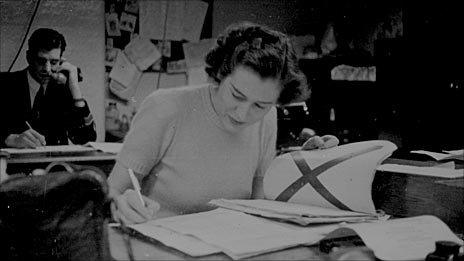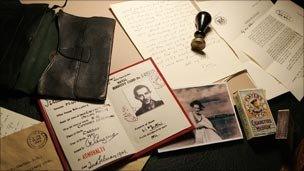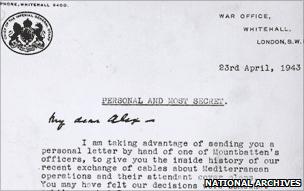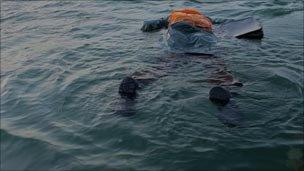Operation Mincemeat: How a dead tramp fooled Hitler
- Published
- comments

Inside the War Office, Operation Mincemeat was months in the planning
During World War II, the Nazis fell for an audacious British plot to pass off a dead tramp as an officer carrying secret documents. How - and are such tactics still in use today?
Rat poison does not furnish the desperate with an easy death. But this was how Glyndwr Michael, jobless and homeless in the winter of 1943, ended his life.
Found in an abandoned warehouse in King's Cross, London, one cold January night, his death certificate noted the cause of death as "phosphorus poisoning. Took rat poison - bid [to] kill himself while of unsound mind".
He was not buried in the capital, nor his hometown in south Wales. Instead, the coroner said he was to be "removed out of England" for burial.
And how. For Glyndwr Michael died a second time - a death that helped change the course of World War II.
After three months on ice in Hackney Mortuary, his body was shipped off to the coast of southern Spain for an elaborate plot to fool the Nazis.
Intelligence officers Charles Cholmondeley and Ewen Montagu had painstakingly transformed the corpse into a soldier - the fictitious Major William Martin - for whom they had spent months creating a plausible backstory.

The "wallet litter" used to paint a picture of the man
Into his pockets went an identity card, ticket stubs and mementos from a fiancee. Chained to his wrist was a briefcase containing a letter marked "PERSONAL AND MOST SECRET", identifying Greece for invasion by Allied forces. Greece was a dummy target - the real plan was to invade Sicily.
When found floating near the port of Huelva, the corpse was assumed to be a British military courier who'd perished in a plane crash. The Spanish authorities agreed to a quick interment - due to the heat and stench of decomposition - and placed his belongings under lock and key.
And so the homeless Welsh alcoholic came to be buried with full military honours in a sunlit Spanish cemetery, under a headstone bearing the name William Martin, RM - for Royal Marines.

The best way to fake a top secret letter was to get a real general to write it
Michael/Martin was but a prop in Operation Mincemeat, brainchild of Ian Fleming, and put into action by Cholmondeley and Montagu, Churchill's "corkscrew thinkers" in the War Office.
The coroner of St Pancras had been in on it, had supplied a suitable body with no visible injuries, and falsified documents to suggest his family had agreed to the plan. They had not - his parents were dead.
Fittingly for a deception dreamed up by a novelist, the true story of the fictional officer was turned into a Hollywood film, The Man Who Never Was, in the 1950s, after Montagu wrote a book about the plot.
A tangled web
But why Spain? While ostensibly neutral, it was riddled with Nazi spies. The corpse was to be the bait for a meticulous, well-connected, yet unimaginative Nazi agent active in the area - Adolf Clauss.

The British hope was that the false documents carried by the fake officer would be convincing enough to be passed up the chain of command to Hitler himself.
At the time, the war hung in the balance with Germany still holding sway across swathes of Europe and Russia.
"This was a period when there was a lot of spying and double-bluffing going on," says Amyas Godfrey, of the defence think-tank Rusi (Royal United Services Institute).
"There were other deceptions, such as a magician dispatched to North Africa to create a fake army out of mirrors and blow-up tanks.
"But Mincemeat was exceptional as the biggest roll of the dice. It was an extraordinary operation in extraordinary times. Do it once and do it well was - and is - very much the ethos."
And the British had an ace up their sleeves, says Ben Macintyre, whose book Operation Mincemeat is now a BBC documentary.
"We were, thanks to the code-breakers at Bletchley Park, essentially reading the Germans' mail. We knew what Hitler was thinking on an hour-by-hour basis."
Thanks to the successful decryption of Germany's Enigma cipher, Bletchley Park could read the top-secret communiques between Hitler and his forces. These intercepts provided Montagu and his team with insights into the key players, and allowed them to track the progress of their plan.
"I doubt such a plan would be feasible today, even in wartime," says Macintyre. "Imagine the scandal if it was revealed that British agents had deliberately stolen a dead body. One of the reasons it worked so well was that the organisers were left alone to get on with it, almost without supervision."
But Cholmondeley and Montagu had form in such matters.
Prior to Mincemeat, they had created a network of fictitious double agents to feed misinformation to the Nazis. These imaginary spies were, like Michael/Martin, given jobs, hobbies, family, lovers and bank managers. The Germans thought they had an established spy network in the UK - in reality, they had none.
As the latest Wikileaks release reveals, the foibles of foreign counterparts is an integral part of intelligence gathering. Just as the leaked US diplomatic cables contain unflattering pen portraits of overseas leaders, Britain's declassified WWII intelligence files detail character quirks of key German figures.
All the better to pitch it right when negotiating - or seeking to deceive.
"The framers of Mincemeat based a lot of their planning on the personalities of the German spies. This has a strong modern resonance in the leaked diplomatic cables, with the emphasis on knowing what your opposite number is like," Macintyre told the BBC News Magazine.
Practice to deceive
After a tense week or so - it took the Germans several attempts to get sight of the briefcase's contents - photographs of the falsified documents made it to Hitler's desk. He was fooled, and moved an entire panzer division - 90,000 soldiers - to Greece.

Ewan Montagu spent months fleshing out the fake officer
Montagu and his team fired off a telegram to Churchill: "Mincemeat swallowed rod, line and sinker."
And so in early July, the Allies attacked Sicily. The island fell with but a fraction of the casualties and ship losses Britain had feared.
"Mussolini was soon toppled from power," says Macintyre. "Forced to confront this Allied invasion from the south, Hitler called off a huge offensive against the Soviets. The Germans were now on the back foot. The Red Army did not stop until it reached Berlin."
The tide of the war turned - thanks, in part, to the body of a tramp set adrift in the Atlantic.